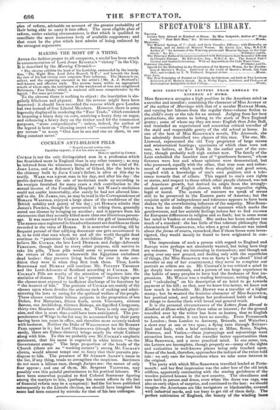COCKLE'S ANTI-BILIOUS PILLS.
" Si quid °midi rectius istis,
Candidus imperti; at nun his utere mecum." lloascs applied by Comma.
COCKLE is not the only distinguished man in a profession which has flourished more in England than in any other country ; as may be inferred from the witnesses brought forward in the trial of ST. JOHN LONG, and as Solomon's Balm of Gilead, like the bricks in the chimney built by JACK CADE'S father, is alive at this day to testify. WARD was a great man in his day, and after his day : the profits derived from the sale of medicines made up according to his receipts furnished for many years a rich contribution to the annual income of the Foundling Hospital : but WARD'S medicines could not confer immortality, else surely he had not allowed him- self to die. Dr. Jason, too, as may be read in the Correspondence of Bosses: WALPOLE, enjoyed a large share of the confidence of the British nobility and gentry of his day ; yet HortacE admits that James's Powders, though he persevered in taking them, generally cured one disease by bringing on another ; and it appears from his statements that they actually killed more than one illustrious person- age. It was reserved for Coexiar to confer the gift of immortality. The names once registered in his advertisement are deathless as those recorded in the verse of Homes. It is somewhat startling, till by frequent perusal of that edifying document one gets accustomed to it, to be told that men whom we and all the world thought dead continue to "patronize Cockle's Anti-bilious Pills." If we may believe Mr. COCKLE, the late Lord Durmast, and Judge-Advocate FERGUSON, though dead to every other purpose, still survive to take his pills. These pills would seem to possess more than the virtues of the matter wherewith the Egyptians embalmed dead bodies : they preserve living bodies for ever in the con- dition they were in when they first took them. Thus, Lords &DENHAM and MURRAY still continue Mr. POULErr THOMSON and the Lord-Advocate of Scotland according to COCKLE. Mr. Coexids Pills are worthy of the attention of inquirers into the statistics of disease. The list of his "patrons" throws light upon the classes most exposed to inefficient discharge of its functions by "the lazarett of bile." The patients of CocKLE are mainly of the classes upon whom devolve the arduous task of making and admi- nistering the laws or caring for the spiritual welfare of the people. These classes contribute bilious subjects in the proportion of ten Dukes, five Marquises, fifteen Earls, seven Viscounts, sixteen Barons, one Archbishop, thirteen Bishops, six dignified Clergymen, thirty-two Members of Parliament, &c. There is only one physi- cian, and that is more than could have been anticipated. The pre- ponderance of Whigs in the list may be accounted for by their party having been ten years in office, and therefore more severely tasked with business. Neither the Duke of WELLINGTON nor Sir ROBERT PEEL appear in it ; but Lord MELBOURNE (though he takes things easily, there are Palace-dinners) brings nearly his whole Cabinet along with him. To this we probably owe Mr. Cocitia's emphatic statement, that his name is engraved in white letters "on the Government stamp." The large proportion of the heads of the Church (there are no "working curates") among Mr. Coca:La's clients, would almost tempt one to fancy that their pursuits pre- dispose to bile. The presence of Sir ANDREW AGNEW'S name in the list, if any thing, tends to strengthen the suspicion. Barristers do not seem a bilious race, though Judges are: the names of only four appear ; and one of them, Mr. Sergeant TALPOURD, may possibly owe this painful preeminence to his poetical labours. We have been somewhat puzzled to find Colonel S1BTHOR1' figuring among the martyrs to bile, (perhaps his recent efforts in the line of financial reform may be a symptom): had the list been published Subsequently to the Lincoln election, we should have imagined his ipame had been entered by mistake for that of his late colleague.


























 Previous page
Previous page